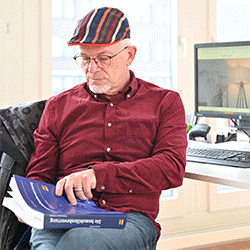When couples get divorced and own a joint property, the big question arises: What happens to it now? The answer is not always easy and depends on many factors. Does the couple have children, does one partner want to stay in the property and what proportion of the property belongs to which partner?
To give an overview of all the possibilities, let us assume, for the sake of simplicity, a divorce case in which the couple bought the house together and both own it equally. Let us call this couple Mr and Mrs Meier. They did not enter into a prenuptial agreement and, like most couples, did not expect to divorce. They also have two children who will live with Mrs Meier after the separation. Only where - that is the question here. Because the couple is not sure what to do with the house. A real estate expert gives them the following options:
Mrs Meier remains living in the property with the children. The property continues to belong to both of them.
The two agree on whether Mrs Meier has to pay rent to Mr Meier, whether she can stay in the house without further payments or whether the rent payments can be offset against the costs of the mortgage of the house or the maintenance costs, if applicable. To ensure that neither partner is disadvantaged, it is also a good idea to seek legal support here.
Mrs Meier stays in the property with the children and pays Mr Meier.
If Mrs Meier wants to stay in the house with the children, she can alternatively pay off her still-husband upon divorce. For this, the property value is offset against the remaining debt, i.e. the mortgages and loans that still have to be paid off. In the case of the Meiers, the house is worth 300,000 euros, they bought the house 10 years ago and still have 200,000 euros to pay off. These 200,000 euros would be paid in future by Mrs Meier alone. Since 100,000 euros of the house have already been paid off, she must also pay 50,000 euros to Mr Meier. This option is only practicable if the partner staying in the house can also afford to repay the loan alone.
The house is transferred to the children as a prior inheritance or gift. Mrs Meier remains living in it with the children until further notice.
If Mrs Meier remains living in the house, there is another possibility to clarify the ownership: The property can be signed over to the couple's children either as a prior inheritance or as a gift, with whom Mrs Meier will remain living in the property for the time being. As guardian of the children, she can dispose of the house until they turn 18. However, this alternative is more suitable for families with only one child. Because with siblings, disputes could arise later.
Mr and Mrs Meier divide the house into two flats, each of which keeps one.
The division of the flat is interesting if both partners still get along well and can basically imagine living near the other. However, the division cannot be carried out without the permission of the municipality. Furthermore, it must be registered in the land register.
Mr and Mrs Meier keep the house and rent it out. The rental income is shared.
If both partners want to move out of the house, it is also possible to rent out the house and share the income. This option is interesting, for example, if one of the children wants to live in the house later.
Mr and Mrs Meier sell the house together and share the proceeds.
In addition to the option of one of the partners staying in the property and paying off the other partner, the sale is one of the most popular variants in divorce. Both parties receive half of the proceeds. It is important that the couple seek good advice from an expert and have the property value estimated before selling. After all, the proceeds from the sale should be the basis for a new start for both of them.
Mr. and Mrs. Meier do not agree and a partition auction is held.
If couples cannot come to an agreement, the only option is often a partition auction. This must be applied for by one of the partners at the local court. Compared to a sale, however, the proceeds are usually lower. Fortunately, the Meiers can come to an agreement without going to court and decide to sell the house together.
Are you getting divorced and don't know which of the options is right for your individual situation? Contact us now. We will be happy to advise you.
Photo: jack191









